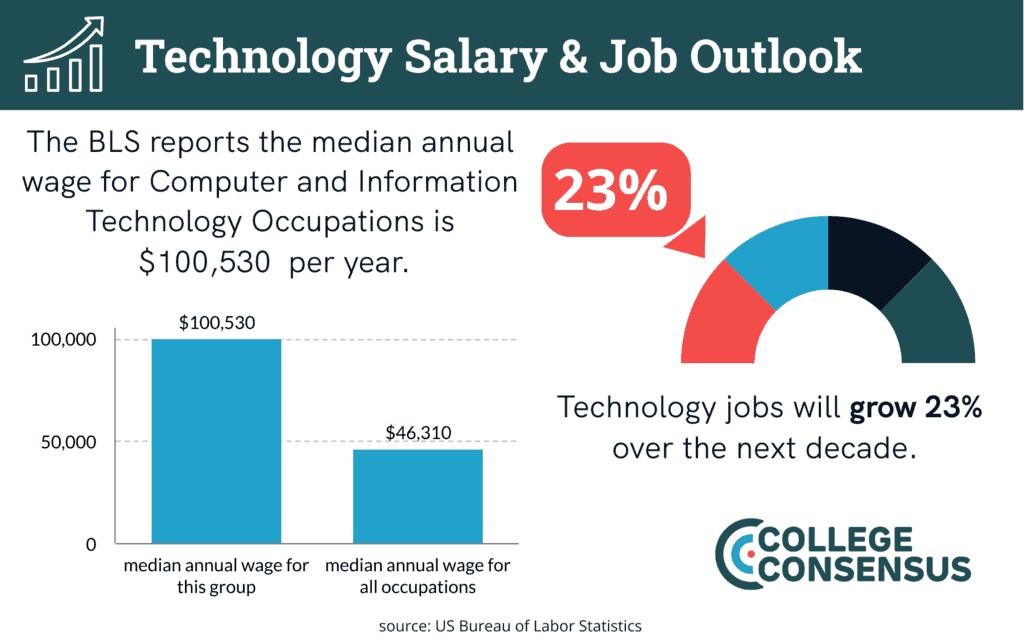Technology is a growing field. In fact, it’s currently one of the fastest-growing industries. Each technology development creates new work opportunities. However, technology is a big field, one that’s complex. This makes it tough to decide where to begin your technology career. That’s why College Consensus is giving you our ranking of the best degrees for tech jobs.
While reading over the degree descriptions, consider which one will suit your natural talents and personality best.


| Tech Related Careers | Degree Level | Annual Salary |
|---|---|---|
| Computer and Information Research Scientists | Master’s degree | $136,620 |
| Computer Network Architects | Bachelor’s degree | $126,900 |
| Computer Programmers | Bachelor’s degree | $97,800 |
| Computer Support Specialists | Associate’s degree | $59,660 |
| Computer Systems Analysts | Bachelor’s degree | $102,240 |
| Database Administrators and Architects | Bachelor’s degree | $112,120 |
| Information Security Analysts | Bachelor’s degree | $112,000 |
| Network and Computer Systems Administrators | Bachelor’s degree | $90,520 |
| Software Developers, Quality Assurance Analysts, and Testers | Bachelor’s degree | $124,200 |
| Web Developers and Digital Designers | Bachelor’s degree | $80,730 |
Recommended Online Degrees
Explore our featured online programs to find the right match for you today.
1. Computer Science
A computer science degree will teach you about information technology. You’ll also learn why some designs operate better than others and how a different data process impacts how a program works. As a computer science student, you’ll study computer design and development. You’ll learn about the digital theories of development and software analysis. With this information, you’ll gain an understanding of system functions.
With the internet, the world is becoming more connected. This means that companies and organizations need computer science experts. The United States Bureau of Labor Statistics (BLS) reports that the computer science field will grow by an estimated 23% over the next decade. This is faster than the expected average growth rate for many other occupations.
You can get a bachelor’s or master’s degree in computer science. Some schools offer a doctorate degree in this area of study.
What jobs are you qualified for with a computer science degree? You could work as a data scientist or a systems analyst.
Computer science professionals command high salaries in a variety of industries. According to the BLS, software developers enjoy a median yearly salary of around $105,000. The top wage earners make more than $160,000 a year.
If you decide to earn a computer science degree, you may need to obtain additional certifications and licenses. These additional learning opportunities will help you with employment. Depending on where you decide to work, you may want to earn licenses or certifications like the:
• Amazon Web Services Certified Solutions Architect
• Microsoft Certified Solutions Associate
• CompTIA Linux+
• CompTIA Cloud+
As a computer science student, be prepared to learn about complex subjects. Earning a degree in computer science will be challenging, but it is definitely doable.
Recommended Computer Science Degrees
Explore our featured online programs to find the right match for you today.
2. Web Development
A web development degree will require you to take information technology classes, ones that focus on web application development and site development. While attending school, you’ll learn different programming languages and how to code.
As a web development student, you’ll learn how to code websites and develop testing processes that help you confirm that your code works or that a website you created operates as you planned.
The BLS predicts that the web development field will grow faster than average with a 13% growth rate in the next 10 years. As a web developer, you’ll work with computers, and you may be expected to resolve technical issues using creative thinking. If you enjoy figuring things out, then you will likely enjoy a career in web development.
According to statistics from 2023, those who work in the web development field earn a median yearly salary of around $78,000. This is higher than the median income for many other jobs.
In the web development field, coursework includes designing interactive websites using HTML and CSS. You’ll also develop programs for databases and learn about web accessibility.
Once you have a degree, you will be qualified to work as a web developer, multimedia artist or a graphic designer. How long does it take to earn a degree in web development? It depends on the degree level that you’re going for, but you should be able to earn a certificate in a year or less while an associate’s degree and a master’s degree take around two years if you enroll in full time education. If you go for your bachelor’s degree, plan to be in school for about four years.
Recommended Web Development Degrees
Explore our featured online programs to find the right match for you today.
3. Software Engineer
Software engineers oversee big tech projects for companies. Those who have a career as a software engineer will combine project management with development. They will also work with software design and testing to resolve business problems.
Most software engineers decide to specialize in applications or systems. Generally, those who choose systems earn a little more than software engineers who focus on applications.
To become a software engineer, you’ll need to earn at least a bachelor’s degree. However, most companies will want you to have a graduate degree.
While earning your degree in software engineering, you’ll take classes in information assurance, open-source software engineering and testing. You’ll also learn about the principles and concepts of software engineering.
If you decide to get a master’s degree in software engineering, you can seek employment as a manager or a senior manager in the field. You’ll also be qualified to work as a software architect, computer system analyst and application developer.
According to the BLS, the median annual salary for software engineers is $110,000. The agency also predicts the field to have a 22% growth rate, which is quicker than the average.
Keep in mind that software engineering is a subdiscipline of computer science, making it a challenging field. However, with dedication and study, you should be able to earn your degree.
Recommended Software Engineering Degrees
Explore our featured online programs to find the right match for you today.
4. Information Technology
Those who go into the information technology field will study how people use computing systems and technological advancements to manage their information. You can earn a bachelor’s or a master’s degree in information technology.
Information technology is a broad career field, which means that you can expect to take classes in cloud computing, data analytics, IT management and information security.
For a bachelor’s degree, you’ll need to take an introduction to networking class. This course will teach you the computer networking basics. You’ll learn how computer networking is needed in business telecommunications and how to detect common problems.
Your coursework will include an introduction to ethical hacking. This class will teach you how to prevent hacking. When you learn how criminals illegally breach computers and networking systems, you can protect a company’s technology and data.
If you decide to earn an information technology degree, companies will hire you to work as an IT analyst or an IT technician. IT analysts consult with companies and assess their IT operations. After observing how a company’s IT department is operating, IT analysts will make improvement suggestions.
With a bachelor’s degree in information technology, you will be qualified for a job as a computer systems manager. You can also work as a computer network architect or a programmer.
Indeed Salaries reports that the average income for information technology positions is around $70,000 a year. IT technicians deliver basic tech support for a company. They earn around $80,000 annually.
The BLS predicts that jobs in the computer and information technology sector will increase by 23%.
Ready to start your journey?
5. Web Design
If your natural skills are on the creative side, then you might prefer a web design degree. While earning your degree, you will learn about basic elements like coding, but the main focus will be how to design websites. For web design, you’ll need to learn how to use graphics and colors. You’ll also receive instruction on the latest platforms and devices.
When you enter a web design program, you’ll be required to take an introduction to programming class. This course will teach you how to write computer programs using languages like Java and JavaScript. You’ll also learn about variables, debugging, logic and flowcharting.
To earn this degree, you’ll need to take an interactive web script course. In this class, you’ll learn how to develop the kind of programs and scripts that automate computer tasks and system commands. You’ll also develop interactive sites, ones that feature pop-up screens and image rollovers.
Once you graduate, you’ll have the opportunity to work as an independent contractor or apply for jobs at tech companies, educational organizations and government agencies.
Those who want to learn how to code a website’s user interface will receive the education that they need with a web design degree. Visual designers usually have a web design degree because the job requires them to decipher design instructions. They need these skills to develop interfaces or art for different platforms. They must be able to do so while maintaining a company’s brand. The average income for visual designers is around $62,000 annually.
After earning a degree in web design, you’ll be able to have a career as a mobile application developer, a digital designer, a graphic designer, a website developer or a user experience designer. The BLS predicts that employment opportunities for digital designers and website developers will increase by 13%.

6. Database Management
A degree in database management will teach you about database structures. You’ll learn how systems store data, about managing software and how to use metadata. With a database management degree, government agencies, nonprofit organizations and major companies will want to hire you to protect their private information.
Once you enter a program to earn a degree in database management, you can expect to take classes like an introduction to database systems. This type of class teaches students about the concepts and terminology of database systems.
Classes for database management will also teach you how technology and people work together to develop useful and effective database systems. You’ll learn how to recognize system interaction and accessibility areas for better use.
Be prepared to take courses that will teach you about the legal, regulatory and ethical considerations that you’ll need to be aware of when you’re working with sensitive information. You’ll learn how you must develop data processes to protect information.
After earning a degree in database management, you can apply for a job as a database administrator and architect. In this job, you’ll manage databases that feature private patient health information or financial information. You’ll need to consider the needs of users and security measures.
A database management degree also qualifies you to work as an information security analyst. In this position, you’ll make sure that a company’s information is protected. You’ll watch for security breaches and work with ethical hackers to find weak spots in your company’s system.
According to the BLS, work opportunities for those with a database management degree will increase by 8%. Along with this, professionals who work in the database management field earn high incomes. The BLS reports that as of 2023, the median yearly income was $98,800.
7. System Administration
A system administration degree prepares you for a career in information technology. In school, you’ll learn how to maintain servers, update software and install hardware. You’ll also be ready to manage user accounts and protect data security.
Businesses that use technology for their daily activities need system administrators to keep their technology operating.
To earn your degree, you’ll take computer networking, system design and database classes. You’ll learn about routers and operating systems. Your professors will also teach you how to explain technical information to people who work in other areas of a company or organization.
After you’ve gained experience in system administration, you may qualify for a management position. In this specialty, you can earn industry certifications or a master’s degree to move into leadership.
Since this is a job position that’s key to most businesses, there are many different kinds of employers that hire people for this role. You can work for a computer system design company, in the education field, for the finance sector or in insurance.
With a system administration degree, you can also work as a computer hardware engineer, computer system analyst or computer programmer.
The IT information that you’ll receive in school may help you create different computer systems. With this degree, some people decide to work as network architects or computer hardware engineers. You will also receive the skills that you need to build software using programming techniques or oversee the development of a new database.
The BLS reports that the median salary for those who work in the computer and information technology field is $91,200 a year.
8. Network Engineering
Network engineering is an expansive field, one that aids with the development, design and maintenance of digital networks and telecommunication systems. Those who work in the field must modify and secure a company’s information technology platform.
Required courses for a network engineering degree include applied networks and security. This class will teach you how to develop and secure computer networks. You’ll begin by learning how to protect small ones like what most people have in their homes. You’ll also learn how to protect networks with strong passwords, firewalls and VPNs.
You’ll need to take a data analysis course, too. This is a key concept in the field. While taking this class, you’ll learn how to use statistics to resolve issues in IT and other business areas.
For your degree, you should plan to take a wireless communication networks class. In this course, you’ll study wireless technologies. You’ll learn how to run, manage, safeguard and maintain wireless systems.
In the field, you can specialize by earning certifications after you’ve received your degree. You can also earn a master’s degree in network engineering.
What jobs can you get with a network engineering degree? With this degree, you can work as a:
• Cyber security analyst
• Network programmer
• Database administrator
According to Payscale, the median salary for those who work in network engineering with a bachelor’s degree is around $81,000 a year.
Keep in mind that the job description, location and technology sector are a few things that could impact what you make annually with a network engineering degree.
9. Cybersecurity
A cybersecurity degree will teach you how to detect, block and handle technology risks. If you choose to get this type of degree, you can expect to work with data, networks and information systems.
You’ll learn about popular cybersecurity attacks, risk management and security software. To earn your cybersecurity degree, prepare to take classes in cryptography, computer science and hacking. Your degree will also require you to take classes in engineering and advanced research techniques.
With a cybersecurity degree, you can work as a cybersecurity analyst. In this role, you’ll protect a company’s information systems and platform. You’ll check for threats and review security controls. You could also have a career as a security engineer. If you are hired for this position, it will be your responsibility to develop, assess and monitor your company’s security software.
If you’re naturally attracted to research, then consider applying for a job as a forensics expert after earning your degree. In this job, you’ll retrieve information from computer systems, rebuild platforms and investigate data breaches. In some cases, forensics experts are called to share information in legal trials.
You’ll also be qualified to work as a security consultant. As a consultant, you’ll share your IT and computer security expertise. A company may hire you to watch for security breaches, handle implementing new security procedures and training employees.
The BLS reports that there will be a 33% growth rate in the information security sector. Along with this, the agency’s data shows that the median annual salary for cybersecurity experts was $102,600. Payscale reports that chief information security officers were earning an average of $170,980 a year.
10. IT Infrastructure
If you become an IT infrastructure engineer, then you’ll construct and maintain the hardware and software elements of your company’s IT network. You’ll work with the routers, servers and platforms.
To earn an IT infrastructure degree, you’ll takes classes in computer networking, data analytics and database management. For this career field, you can also earn certifications to specialize. Certifications include:
• Google’s System Administration and IT Infrastructure Services
• IBM’s Introduction to Containers w/Docker, Kubernetes and OpenShift
• The Linux Foundation’s Introduction to Service Mesh with Linkerd
Once you have your degree, you can work as an application support analyst, a systems operator or a network administrator.
You’ll be a good fit for this field if you have analytical and critical thinking skills. Working in IT infrastructure requires you to be a problem solver. Issues can develop at any time, ones that may greatly impact a company’s ability to do business. In this field, you’ll need to find the root cause of a problem and select the best solution quickly.
The business landscape is becoming increasingly complex. This means that many companies need customized platforms and products for their operations. Tailored platforms will ensure that they can provide the service that they promised for their customers and maintain their competitive edge. In this field, it will be your job to understand your company’s particular needs.
Payscale reports that the average salary for someone working as an IT infrastructure engineer is around $79,000 a year.
Final Considerations
The technology sector is a secure career choice since the job field is a constantly growing one. Keep in mind that a career in technology will likely require you to update your skills and knowledge frequently, so before going into technology, make sure that you like learning. The great thing about the technology field is that it features a lot of diversity. This means that you will likely find an area that will suit your work personality.
Be sure to commit to an education path once you’ve decided which direction is best for you. The degree that you choose will give you a solid foundation that will help you be successful in your career.
Related:
15 Best Degrees to Work from Home
Best Online Degrees for Working Adults


